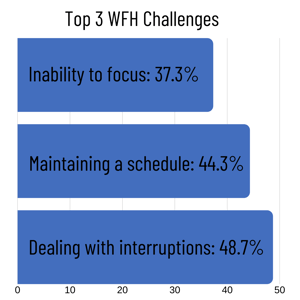Working from home (WFH) inherently has its challenges.  Although I imagine many of us are now finding that out (thanks, COVID-19), each of our experiences during this transition likely differs considerably depending on the unique situations we’re finding ourselves in. For some of you, that could mean suddenly having kids at home while you work, while for others it may just be as simple as swapping an office desk for a kitchen table. In any case, when 56% of the US workforce is suddenly moved into remote working within a matter of weeks, there has to be some universal growing pains.
Although I imagine many of us are now finding that out (thanks, COVID-19), each of our experiences during this transition likely differs considerably depending on the unique situations we’re finding ourselves in. For some of you, that could mean suddenly having kids at home while you work, while for others it may just be as simple as swapping an office desk for a kitchen table. In any case, when 56% of the US workforce is suddenly moved into remote working within a matter of weeks, there has to be some universal growing pains.
In normal circumstances, research has actually shown that working from home has some big perks, with a number of studies finding that remote workers, by and large, are both happier and more productive. But with a global pandemic, widespread economic uncertainty, and the uprooting of our typical routines, it’s safe to say that we’re not in normal circumstances - and probably not reaping those work from home benefits, either.
So what are the biggest problems we’re all grappling with in the mass transition to working from home?
In order to answer this question, Beyond BookSmart conducted a survey via social media and email that asked participants to share their experiences in moving to remote work. We were particularly interested in this transition’s impact on stress, productivity, and focus. Those who participated were asked to compare their typical day prior to the pandemic with their typical day now that they’re working remotely.
With 271 responses, we were able to gather a number of fascinating insights that we’re eager to share. Here are the key findings.
1. Dealing with interruptions is the most common work-from-home challenge
In the survey, participants were asked to pick their top three biggest challenges while working from home. Out of the options given,  nearly half (48.7%) listed dealing with interruptions as their top difficulty, followed by maintaining a schedule (44.3%), and an inability to focus (37.3%). Notice a trend? These challenges are all interconnected, as they each relate to our own internal self-management abilities to some degree, rather than problems out of our control, like bad wifi or a cramped workspace. The good news is that these are problems that can be addressed and improved upon today, whereas you’d have quite a wait to get a remodeling project completed to expand your home office space (even if it may be fun to daydream about).
nearly half (48.7%) listed dealing with interruptions as their top difficulty, followed by maintaining a schedule (44.3%), and an inability to focus (37.3%). Notice a trend? These challenges are all interconnected, as they each relate to our own internal self-management abilities to some degree, rather than problems out of our control, like bad wifi or a cramped workspace. The good news is that these are problems that can be addressed and improved upon today, whereas you’d have quite a wait to get a remodeling project completed to expand your home office space (even if it may be fun to daydream about).
2. People are feeling more unfocused and unproductive
When asked to compare levels of focus and productivity before and after the transition to .png?width=300&name=Top%203%20WFH%20Challenges%20(2).png) working from home, our participants revealed a significant decrease in both abilities. Focus and productivity dropped by 17% and 15% respectively, according to our survey participants who are now working from home full time rather than commuting. Of particular note, only 7% of these same respondents reported that their focus and productivity were poor prior to the pandemic. Since transitioning to work from home, this number jumped to 38% for both - meaning over one third of respondents are having substantial difficulties in both of those areas in their adjustment. The drop in productivity, specifically, is an interesting finding as many studies prior to COVID-19 showed that home workers were actually more productive than their office counterparts. We can speculate that workers forced into a WFH situation may not have been prepared with the tools and strategies to help them be focused and productive. This, coupled with the added stress of a pandemic, could partially explain why so many are feeling unproductive.
working from home, our participants revealed a significant decrease in both abilities. Focus and productivity dropped by 17% and 15% respectively, according to our survey participants who are now working from home full time rather than commuting. Of particular note, only 7% of these same respondents reported that their focus and productivity were poor prior to the pandemic. Since transitioning to work from home, this number jumped to 38% for both - meaning over one third of respondents are having substantial difficulties in both of those areas in their adjustment. The drop in productivity, specifically, is an interesting finding as many studies prior to COVID-19 showed that home workers were actually more productive than their office counterparts. We can speculate that workers forced into a WFH situation may not have been prepared with the tools and strategies to help them be focused and productive. This, coupled with the added stress of a pandemic, could partially explain why so many are feeling unproductive.
3. Stress levels have increased substantially since beginning WFH
Survey participants were also asked to compare their stress levels before and after the transition to working from home. .png?width=300&name=Top%203%20WFH%20Challenges%20(1).png) The results showed a 12% increase in overall stress levels. Although this may not seem like a big jump, breaking down the data shows that there’s more to the story. Before COVID-19, only 14% of respondents reported high levels of stress, whereas that number has jumped to 42% after the transition. More people are experiencing extreme levels of stress, which is understandable given the current circumstances. When routines are broken and stressors arise out of our control, it becomes all the more important to incorporate coping strategies into our lives to prevent feeling overwhelmed.
The results showed a 12% increase in overall stress levels. Although this may not seem like a big jump, breaking down the data shows that there’s more to the story. Before COVID-19, only 14% of respondents reported high levels of stress, whereas that number has jumped to 42% after the transition. More people are experiencing extreme levels of stress, which is understandable given the current circumstances. When routines are broken and stressors arise out of our control, it becomes all the more important to incorporate coping strategies into our lives to prevent feeling overwhelmed.
Editor's Note: Insights #2 & 3 apply to the 198 participants who transitioned from commuting to work from home, rather than all 271.
The Takeaway
So what does all of this data show? Well, it’s clear that the main areas of difficulty people are experiencing in the adjustment to working from home all revolve around executive functioning - or more specifically, the ability to manage emotions, focus attention, and stay effective.
These are typically the hardest cognitive abilities to master, and even those with strong Executive Function skills will find themselves occasionally struggling with focus or stress management. For many, both the pandemic and forced transition to working from home have provided the perfect catalyst for these issues to emerge, if they hadn’t already. After all, it’s normal to feel extraordinary stress and worry in this COVID-19 climate. But when those very emotions are left unmanaged, they have the potential to greatly interfere with the cognitive abilities we need to be effective.
Working from home has the potential to be an ideal working scenario for many. Even for those who may prefer to go into a physical workspace, having the luxury to occasionally work from the comfort of your home can provide a nice change of pace. However, this forced transition has removed our ability to prepare and anticipate for the change, leaving many of us unequipped with the tools and strategies we need to adapt.
Photo by Charlz Gutiérrez De Piñeres on Unsplash
Visit our events page to see upcoming webinars about work from home challenges.

.png?width=1500&name=Webinar%20Email%20Header%20(2).png)